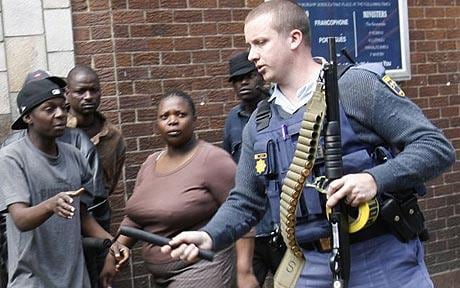The 2010 FIFA World Cup is drawing to an end. On the pitch, it has been filled with thrilling moments and surprising turns. Off the pitch … not so much.
Ever since South Africa won the bid to host the 2010 FIFA World Cup, the government has been feeding promises and creating expectations about how good this is for the country, for the economy and for the workers and the poor.
This World Cup will make more money than any in the history of the event. A total of $3.3bn has been raised by FIFA from television and sponsors, dwarfing the amount made in Germany.
It has also been one of the most expensive World Cups ever. FIFA has spent $1.1bn. South Africa has paid out $5bn getting the Rainbow Nation ready for its biggest moment since the 1995 Rugby World Cup, building stadiums, roads and public transport links.
The Cape Town seaside stadium, with 37,000sq m of glass roofing to protect spectators from the elements, is the most expensive building. It rises amid mounting claims that South Africa – where half the population still survives on an average of £130 a month – has mortgaged itself to host a football spectacular that will bring little benefit to its people.
As reported in the documentary, Fahrenheit 2010, the £68 million Mbombela Stadium has been built on the site of a school serving a poor community in Nelspruit, near the Kruger Park. It seats 46,000 and will be used for four matches, while local residents live in dwellings without water or electricity.
The stadiums are magnificent, the atmosphere and anticipation is heard through the sounds of the vuvuzela. But Dennis Brutus, late sports-justice activist, predicted that the World Cup would result in a shocking waste of resources. He said, “When you build enormous stadia, you are shifting those resources from building schools and hospitals and then you have these huge structures standing empty. They become white elephants.”
Former president Thabo Mbeki also predicted. He claimed the 2010 World Cup would be the moment when the African continent “turned the tide on centuries of poverty and conflict“. Such ambitions were never likely to be fulfilled by a sports event, no matter how big and how lucrative. But the claim was grand, almost as grand as the bill paid for the event.
In the end, will South Africa have spent billions of dollars on a 30-day advert that quickly fades as the sporting world moves on? If so, South Africa will have missed a great opportunity, a defining opportunity, to think through and act on celebration.
Thabo Mbeki’s words could have provided that opportunity. The conflicts that mark South Africa today — include poverty, xenophobia, racism, sexism, environmental degradation, violence, health and well being — are not exclusively South African or African conflicts. While the world press and much of the South African press has suddenly discovered the poors of South Africa, from Blikkiesdorp to Khayelitsha to Barracks and beyond, who has discovered the particularly South African celebration?
What is there to celebrate? Since the transition from the apartheid regime, South Africa has celebrated and been celebrated for democracy, freedom, rule of law. These are fragile and important structures, which have been avoided in the current State discussion and even more in those of FIFA.
In 1994, for example, South Africans celebrated democracy, meeting by meeting, engagement by engagement.
When the Reconstruction and Development Programme was presented, in 1994, it emerged from RDP councils that had tried to include everyone. While the RDP itself has had mixed results, the process of a national critical conversation was important. It involved domestic workers and their bosses as equal participants, if not always partners.
The 1994 Women’s Charter for Effective Equality, organized by the Women’s National Coalition, emerged from a creative research and inquiry campaign that, from 1992 to 1994, attempted to include all women, where they were, not where they were meant or imagined to be. It too involved domestic workers and their bosses, and their inputs were of equal and interrelated value and weight.
And today? Other than a few very transitory jobs, what has the World Cup done for domestic workers in South Africa? Has it promoted their rights? Has it engaged or consulted them? Has it told them that, irrespective of legal status, they are full and free citizens who are covered and cherished by the Law? No.
If anything, the private lives and domestic spaces in which real democracy either begins or founders, have gone untouched and uncelebrated. Not only by FIFA but also by the media and by advocates for social justice.
There has been no engagement in any kind of consultative democratic and democratizing process. And so the poor and disenfranchised simmer with resentment and a yearning for democracy.
What is there to celebrate? The games have been exciting, but games are always exciting. South Africa could have offered a precious space to witness transformation in process. South Africa once gave transformation a new importance. It was a gift the Rainbow Nation offered the world. This World Cup was an opportunity to live it at home. An opportunity squandered.
(Photo Credit: Reuters / Paul Hanna / Daily Maverick)

